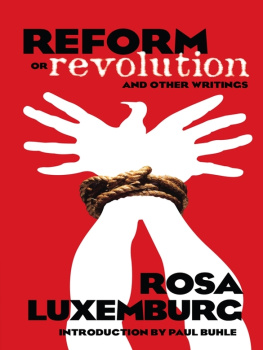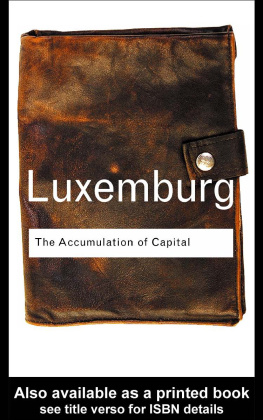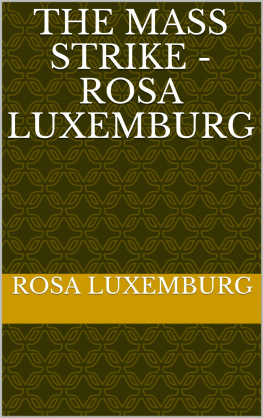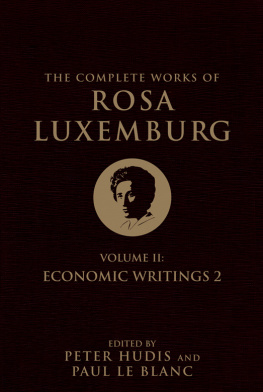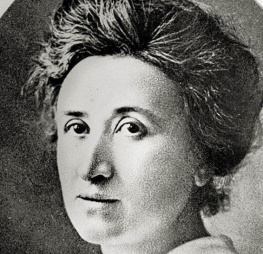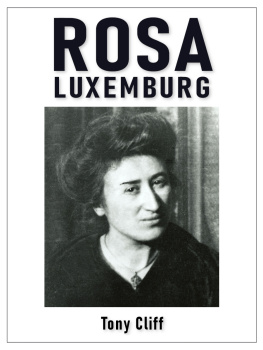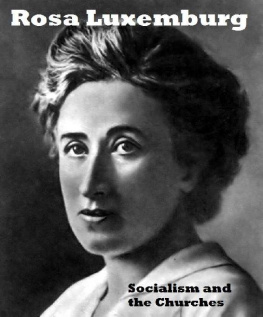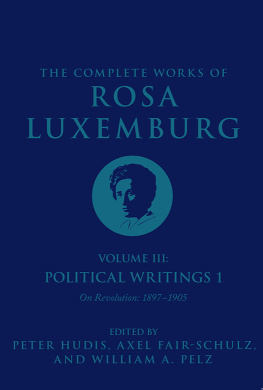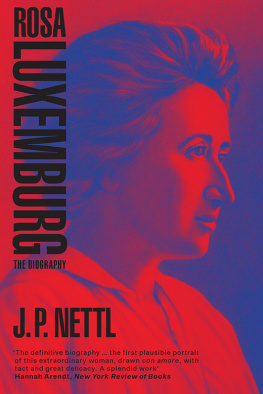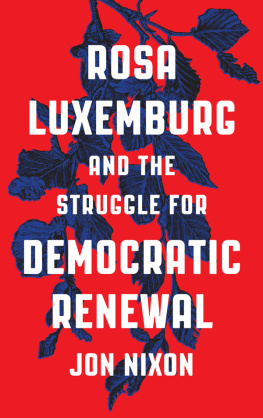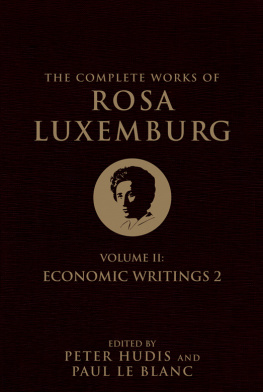Copyright
Introduction copyright 2006 by Paul Buhle
Copyright 2006 by Dover Publications, Inc.
All rights reserved.
Bibliographical Note
This Dover edition, first published in 2006, is an unabridged republication of four essays by Rosa Luxemburg. An Introduction to the Dover Edition, written by Paul Buhle, has been specially prepared for the present volume.
Reform or Revolution is reprinted from the second edition of the work, translated by Integer, originally published by Three Arrows Press, New York, in 1937 (first publication: 189899 under the title Social Reform or Revolution ; second edition: 1908).
Leninism or Marxism? was first published as two articles entitled Organizational Questions of the Russian Social Democracy in 1904; the work was then translated by Integer in 1934, and published in the U.S. as a pamphlet entitled Revolutionary Socialist Organization. The current title is taken from a 1935 Scottish publication of the work by the Anti-Parliamentary Communist Federation.
The Mass Strike, the Political Party and the Trade Union, first published in pamphlet form in 1906, was translated into English by Patrick Lavin and published by the Marxian Educational Society, Detroit, Michigan, in 1925.
The Russian Revolution, written in 1918 but first published posthumously in 1922, is reprinted from the Bertram D. Wolfe translation, originally published by Workers Age Publishers, New York, in 1940.
Library of Congress Cataloging-in-Publication Data
Luxemburg, Rosa, 18711919.
Reform or revolution and other writings / Rosa Luxemburg ; introduction to the Dover edition by Paul Buhle.
p. cm.
Includes bibliographical references.
9780486147222
1. Socialism. 2. Radicalism. I. Title.
HX72.L89 2006
335.43dc22
2006040179
Manufactured in the United States of America
Dover Publications, Inc., 31 East 2nd Street, Mineola, N.Y. 11501
INTRODUCTION TO THE DOVER EDITION
ROSA Luxemburg, a giant of the twentieth-century Socialist movement and a martyr to its cause, may be considered in some respects a distant, almost forgotten figure for the twenty-first century. So many disappointments and disillusionments have been suffered in the dream of an egalitarian global order, so often has capitalism rebounded from crisis, that Luxemburgs work might appear to be the work of some ancient scribe dedicated to a mystic religion.
But it need not be seen in this way. Rosa Luxemburgs hopes for a more just world along with her warnings against the consequences of the current structures are still very much with us. A Polish Jew, member of an intelligentsia and a people eradicated by the Holocaust, Luxemburg was at once a supreme democrat and keen analyst of global economic imbalance. Better than anyone else among an exceedingly rich generation of radicalized intellectuals, she perceived the dangers of confining the mobilization of working class energies to a political vanguard. She also argued, with moral certainty if (arguably) analytical imprecision, that the underdevelopment of the non-industrial world, relegating it to a long-term subordinate status, was the temporary salvation of empire at far too great a human and ecological cost. In her brilliance but also her tenderness, Luxemburg analyzed the woes of emerging industrial society. Her warnings if not her proposed solutions stand directly before us, and grow steadily more ominous.
Born in Poland in 1871, Rosa was the child of a prosperous family devoted to their brilliant daughters education, first at home and then abroad, in Zurich. She became a dedicated Polish revolutionist in her early twenties, then moved to Germany and squarely into the worlds leading Social Democratic Party. There, she quickly made her mark, assaulting the gradualist theories of those who insisted that capitalism would grow almost seamlessly into Socialism, through voting power and without much strife. Her energetic critique found its truest target almost immediately: the bureaucracy.
It was the heavy-handed bureaucratic apparatus of the German Socialists that prepared Luxemburg to view the Bolshevik Party of V. I. Lenin as cut from similar cloth. But there can be little doubt that her breaking off intimate relations with a lover, Socialist intellectual Leo Jogiches, no longer accepting him as her mentor, had a parallel effect of unleashing her powers of self-definition, free of male domination. The principles of freedom, activity directed from below, by the ordinary folk, drawing lessons as they took action, became watchwords for her unique brand of Socialism.
She also regarded herself as Marxist intellectual par excellence, repudiating revisions that offered compromise with the powers-that-be but also setting off in new directions, guided by the doctrines of Marx and Engels. Nowhere was this so true as her view of imperial economics. In a Europe whose Socialists mostly thought of the colonies as sites of gradual and inevitable, if painful, industrialization, of backward peoples being trained to join modern society, she stood out dramatically. Not only was she a fierce partisan of those under the lash, bringing out raw materials under the worst of labor and living conditions; she insisted that the world market was a unified phenomenon. All working people ultimately faced similar rules, and the solidarity of the least with those most oppressed constituted a simple condition of humanness, let alone Socialist commitment. So long as empire could be extended economically and its burdens intact upon the populations least able to defend themselves, the system would survive.
Her economic treatise, The Accumulation of Capital, appeared in 1913, a year before the European war began, and the last six years of her life became a whirlwind of activities and of suffering unto death. A wave of strikes by the least skilled, least unionized workers in the years before the war had seemed to promise (as did the Industrial Workers of the World in the United States, during the same years) an opening for real industrial democracy, minus the powers of the labor and Socialist bureaucracy. The war, its very possibility denied by generations who had not seen the like since the Napoleonic Wars, meant something very different. Luxemburg was among the first to throw aside illusions, to recognize and to explain, with her characteristic eloquence, its full and horrifying significance.
She wrote her famous Junius Pamphlet of 1915 from a prison cell, as the leadership of the German Social Democrats rallied to the cause of the Fatherland. She argued that the vast electoral apparatus, backed by a formidable union membership of the SDP, had been a house built upon sand after all. Nationalism had triumphed in an ocean of blood, as workers in competing soldiers uniforms slaughtered each other for purposes more imperial than patriotic.
Luxemburg was badly mistaken in her idealistic expectations of egalitarian resurrection arising out of the ashes. The disillusionment with war at the front and back at home was severe nearly everywhere during the war, but broke the system open only in the desperate East, from Hungary to the Russian empire. Adamantly opposed to what she perceived as the undemocratic modus operandi of Bolshevism, Luxemburg nevertheless recognized the new Russian regime of 1917 as arising out of the workers councils (or Soviets) and bearing the stamp of a different order. When the German monarchy collapsed in 1918, a German Communist party formed, with her eager support. As a revolutionary outbreak evidently neared, she threw herself into the cause of predominantly young reds, known as Sparticists. Old-fashioned Socialist regulars, aghast at the prospect of capitalism actually overturned, assaulted her in print even as right-wing paramilitary units went on the search for subversives to assassinate. Luxemburg was among those leaders murdered in early 1919. The assassination was, in many respectsby no means excluding its anti-Semitic undertonesan anticipation of Hitlers rise.


